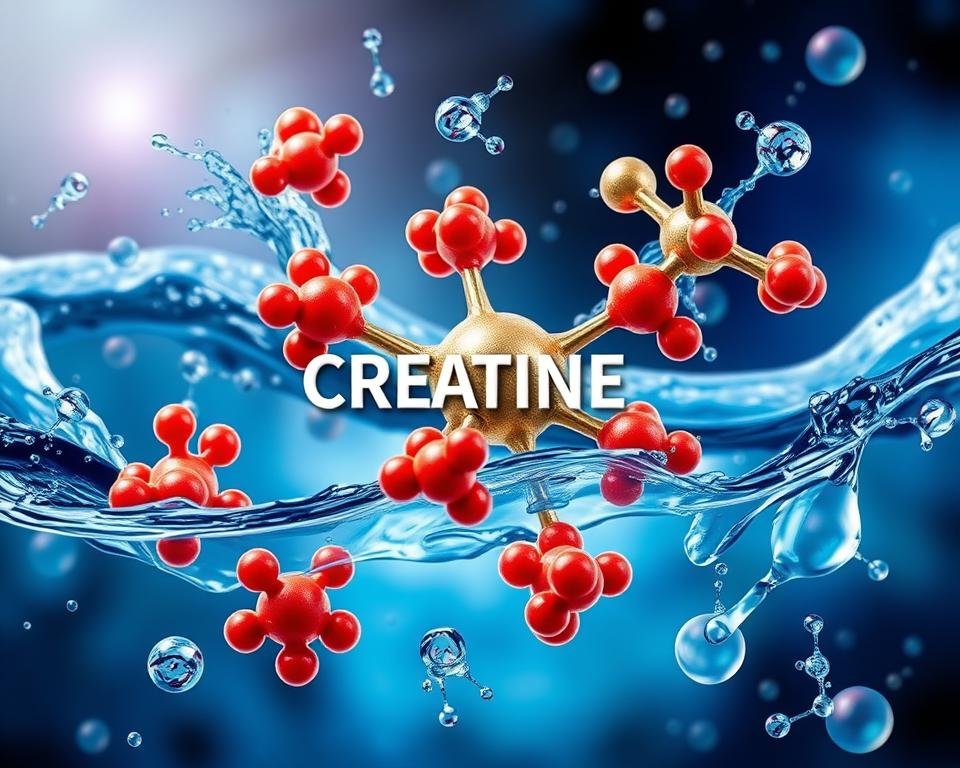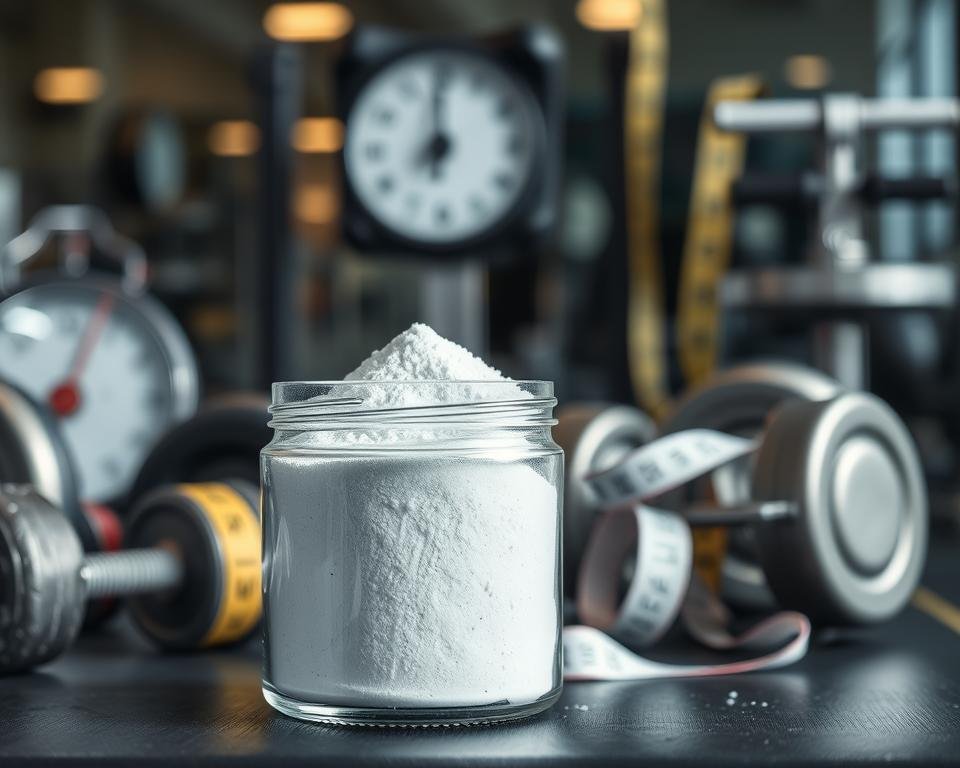
When it comes to the world of fitness and bodybuilding, few supplements have garnered as much attention as creatine. Often viewed as a cornerstone in the pursuit of athletic excellence, creatine is widely celebrated for its impressive ability to enhance performance and promote muscle growth. For those eager to bulk up or improve their physical prowess, understanding the relationship between creatine and muscle gain is essential. However, with a plethora of options and varying advice on creatine dosage and benefits, navigating this supplement landscape can be overwhelming. Whether you’re a seasoned athlete or just starting your fitness journey, this guide aims to illuminate the key aspects of creatine, helping you harness its potential for weight gain and muscle development effectively.
Many athletes and fitness fans look into supplements like creatine to grow muscle and boost performance. But, the link between creatine and weight gain can be confusing. We’ll look into the science of creatine and its effect on weight, clearing up common myths.
Let’s share a story about a bodybuilder named Michael. He was tracking his gym progress closely. After months of hard work and diet, he noticed his weight went up by several pounds. At first, he worried it was extra fat. But, as he kept working out, he saw his muscles had grown a lot. Creatine was the secret to his success.
Michael’s story isn’t alone. Research shows creatine can make you weigh more, with people gaining about 3.75 pounds in 30 days. A 2016 study found young soccer players gained 2.2 pounds in just 7 days with creatine. But, what causes this weight gain and how does it affect your fitness goals? Let’s dive into the science and debunk the myths.
Introduction
Creatine is a popular supplement in sports and fitness. It’s found in foods like red meat and fish. Taking creatine boosts your muscles’ energy for intense activities.
This can lead to better strength, power, and muscle growth.
Definition of Creatine and its Role in Athletic Performance
Creatine is made by our bodies and stored in muscles. It helps muscles work well during short, intense efforts. Taking creatine increases your energy levels, improving your athletic performance and muscle growth.
Overview of the Relationship Between Creatine and Weight Gain
Creatine can also cause weight gain, mainly due to water in muscles. This weight increase is temporary and not fat. Knowing how creatine affects weight helps you set realistic fitness goals.
“Creatine has been found to be effective in increasing muscle strength and size over time.”
Can Creatine Cause Weight Gain?
Creatine is a popular supplement among athletes, particularly in the realm of bodybuilding. It is well-known for its potential benefits in enhancing muscle mass, strength, and overall athletic performance. However, one of the common concerns among those considering creatine supplements is whether they can lead to weight gain. Understanding the relationship between creatine and weight is crucial for individuals who may worry about the implications on their physique or performance.
Firstly, it is essential to recognize that the weight gain associated with creatine use is often due to an increase in water retention within the muscles. When individuals start taking creatine, the muscles absorb more water, leading to a temporary increase in body weight. This is usually seen in the initial phases of supplementation and is typically not indicative of fat gain. In some cases, this increase can also reflect actual muscle growth as a result of enhanced training performance and recovery, particularly with consistent use combined with effective workouts.
The creatine supplements side effects are generally mild, with weight gain being a focal point of concern. While for some, this might be seen as a disadvantage, bodybuilding enthusiasts often view it more positively, as it can be part of the muscle-building process. Moreover, gains in strength and endurance can allow individuals to push themselves further in the gym, leading to long-term muscle hypertrophy, which can contribute to overall weight gain in a more favorable way.
In summary, while creatine can lead to an initial increase in weight primarily due to water retention, its benefits in promoting muscle growth and improving performance in bodybuilding often outweigh these concerns. Many athletes find that by understanding how creatine works and embracing its advantages, they can incorporate it effectively into their training regimens without worrying about unwanted weight gain. Ultimately, as with any supplement, it’s important for individuals to consider their goals and monitor how their body responds.
Many people wonder if creatine, a popular sports supplement, can lead to weight gain. The answer is yes, creatine can contribute to weight gain. But it’s mainly because of water retention, not fat.
When you start taking creatine, your muscles may look fuller and more defined. This happens because creatine pulls water into the muscle cells. This results in a temporary increase in body weight. On average, people may gain 2 to 4.5 pounds during the initial creatine loading phase.
Potential for Muscle Mass Gain
In addition to water weight, creatine can also help increase creatine muscle growth. It makes you better at doing high-intensity exercises. This can help you build more lean muscle mass over time.
Research shows that people who take creatine and do resistance training can gain up to 1.8 kilograms (about 4 pounds) of muscle mass after 12 weeks.
“Creatine supplementation, combined with resistance training, has been shown to lead to greater gains in lean muscle mass compared to resistance training alone.”
So, while the initial weight gain from creatine is mainly due to creatine water retention, using it for a while can lead to creatine weight gain. This is because of the increased muscle mass. This can be a good thing for those wanting to get stronger and bigger.
Does Creatine Make You Gain Fat?
Many people think creatine leads to fat gain, but it doesn’t. The quick weight gain from creatine is mostly water, not fat. If you eat right and exercise, creatine won’t make you gain fat.
Creatine and Weight Gain
Research shows creatine can make you gain up to 3.75 pounds. This gain is mostly water in your muscles, not fat. Studies say creatine might change your water weight but doesn’t add body fat.
People often get confused about creatine and fat loss. But creatine actually helps build lean muscle. It boosts your workouts and recovery, helping you reach fitness goals. This might even help reduce creatine fat gain by increasing your metabolism.
“Professional athletes widely appreciate creatine for its benefits in muscle growth, athletic performance, and recovery.”
The first weight gain from creatine might seem bad, but it’s not permanent. It’s not fat. With good hydration, food, and training, you can handle the water weight from creatine.
The Science Behind Creatine and Water Retention
Creatine is a supplement that boosts athletic performance and muscle growth. But, it can also cause weight gain due to water retention. Let’s explore why this happens.
Understanding the Osmotic Properties of Creatine
Creatine pulls water into muscle cells. When you take creatine, it increases creatine phosphate. This boosts ATP production, the body’s energy source. It also raises water levels inside and outside cells.
Effects of Creatine on Intracellular and Extracellular Water Levels
Water retention makes muscles look bigger and fuller. But, it can also make you feel bloated. Studies show creatine increases total body water, mostly in muscle cells.
“Creatine supplementation led to a significant increase in muscle Cr concentration, body mass, and total body water (TBW).”
This water gain is good for athletes wanting bigger muscles. But remember, it’s mostly water, not muscle growth.

Knowing how creatine osmotic properties and creatine water retention mechanism work helps manage weight changes. This way, you can focus on building lean muscle, not just water.
Managing Creatine Weight Gain
If you’re worried about water retention and weight gain from creatine, there are ways to lessen it. Drinking more water is a great start. It helps your body get rid of extra water. Also, eating less sodium can help reduce water retention. Try to eat more fresh fruits and veggies and cut down on processed foods.
Another good idea is to eat fewer carbs. Carbs can make your body hold onto water. Aim for 225-325 grams of carbs a day. Also, give your body time to get used to creatine. As you keep exercising, the water retention might go down.
By following these tips, you can handle the water retention and weight gain from creatine. The first weight gain is usually temporary. It can be reduced with enough water, managing sodium, and patience as your body adjusts.
does creatine make you gain weight
Many people worry about gaining weight when they think about taking creatine. It’s true that creatine can make you weigh more quickly. But this weight gain is mostly because of water, not fat.
Creatine pulls water into your muscles, making them look bigger and fuller. This can make the scale go up. But it doesn’t mean you’re getting fatter. If you eat well and exercise, the extra water from creatine won’t turn into fat.
“Research indicates that creatine supplementation increases both intracellular and extracellular water levels, resulting in a temporary weight gain.”
Studies also show that creatine helps muscles grow when you do resistance training. The water that creatine brings into your muscles might even help your muscles grow more. This can lead to more muscle mass over time.
So, while it’s natural to worry about does creatine make you gain weight, the weight gain from creatine is usually not a big deal. Just remember to keep your diet and exercise routine in check. The good effects of creatine can be worth the temporary water weight.

Creatine for Building Muscle Mass
At first, creatine supplements make you gain weight because of water. But, research shows they also help build lean muscle over time. Creatine boosts ATP, the body’s main energy source. This lets your muscles work harder and longer, making your workouts more effective.
To get the most out of creatine for muscle building, try these tips:
Follow the Recommended Dosage
The usual dose is 3-5 grams a day. Some people do a loading phase. They take 20 grams daily for 5-7 days to quickly fill up muscle stores.
Combine with Carbohydrates
Studies say taking creatine with carbs can help it get into your muscles better. This might make it more effective for muscle growth and performance.
Time Your Intake Around Workouts
Many find creatine works best before or after workouts. It fuels your muscles during exercise and helps with recovery.
“Studies have shown that creatine supplementation, when combined with resistance training, can aid in the development of lean body mass and muscle growth.”
By using these strategies, you can unlock creatine’s muscle-building power. You’ll see better results from your strength training.
Creatine Loading and Dosage
Many athletes and fitness fans use a “creatine loading phase” strategy. This involves taking 20-30 grams of creatine daily for a week. Then, they switch to 3-5 grams a day. This method aims to quickly fill muscles with creatine for better performance and muscle growth.
Studies show creatine loading can increase muscle creatine by 20% to 40%. A 1996 study found muscles can fully absorb 3 g of creatine in 28 days. A 2022 study also showed that 3 g of creatine daily for 28 days boosted muscle creatine levels.
Though the loading phase might offer quicker gains, the long-term benefits of creatine are the same. Research links creatine supplements to significant muscle mass gains with resistance training.
“The International Society of Sports Nutrition (ISSN) states that up to 30 g per day of creatine for 5 years is generally well tolerated by healthy individuals.”
After the loading phase, taking 3-5 grams of creatine daily is advised. This helps keep the benefits while avoiding water retention. The daily dose for loading is 20 to 30g, with a typical scoop being 5g. To keep creatine levels up, a 5g maintenance dose is suggested after workouts.
Remember, the initial water weight gain from creatine is normal and temporary. Creatine draws water into muscle cells, causing the weight gain. But it doesn’t lead to fat gain. Always talk to a healthcare professional before starting supplements, especially if you have health issues or are pregnant or nursing.
Creatine Safety and Side Effects
Many people worry about the safety of supplements. Luckily, creatine is one of the safest out there. It has been studied a lot and is well-tolerated, even at high doses.
Some people might experience minor creatine side effects like stomach upset or diarrhea. This could be because of how creatine works in the body. To avoid these issues, take creatine in smaller doses throughout the day. You can also dissolve it in hot water or use a micronized form.
A 2021 review looked into common side effects of creatine. It found no evidence of kidney damage, liver damage, kidney stones, or weight gain. In fact, research shows that taking creatine daily for years is safe.
“Creatine supplementation is linked to enhancing exercise performance, muscle mass, and recovery.”
Studies also show that creatine doesn’t cause dehydration or muscle cramps. It might even help prevent these issues when working out in the heat. Creatine doesn’t harm the kidneys or liver, according to research.
In summary, creatine is safe for most people when used correctly. With the right dosage and precautions, creatine side effects and creatine safety concerns are rare. It’s a good choice for those wanting to boost their athletic performance and health.
Additional Benefits of Creatine
While creatine is known for boosting performance and building muscle, it may also have other creatine health benefits and creatine cognitive benefits. Research shows it could protect against brain injuries, lessen stress and sleep loss effects, and enhance mental skills.
One study found that creatine boosts protein synthesis, aiding in muscle growth. It also improves strength and daily tasks in people with Parkinson’s disease, especially when combined with weight training. Creatine has even been shown to help against amyotrophic lateral sclerosis (ALS), increasing survival by 17%.
Vegetarians who take creatine see a 20–50% boost in memory and intelligence tests. Older adults who used creatine for 2 weeks also showed better memory and recall.
“Creatine has been researched for over 200 years, with clinical trials lasting up to 5 years reporting no adverse effects in healthy individuals.”
These cognitive and health benefits make creatine appealing to more than just athletes. It’s a valuable supplement for anyone wanting to support their overall health. Creatine’s safety and versatility make it a great addition to many wellness routines.
Conclusion
Creatine is a well-known supplement that can help you gain weight. But, most of this weight comes from water, not fat. Knowing how creatine affects water and muscle can help you use it wisely.
It’s great for athletes wanting to improve their performance or build muscle. When used right, with a good diet and exercise, creatine can be very helpful. It can boost your strength, power, and muscle growth.
Before starting creatine, think about your goals and health. Talk to a doctor or healthcare expert. Using creatine responsibly can enhance your fitness journey. It can improve your athletic skills, increase muscle, and boost your health.



Pingback: 3500 Calorie Meal Plan for Healthy Weight Gain
Pingback: Can Bichon Frize Puppies Eat House Food: Feeding Guide
Pingback: Can Dogs Have Avocado: Safe Feeding Guide
Pingback: Can Dogs Eat Tomatoes: Safe Feeding Guide
Pingback: Are Snake Plants Toxic to Cats and Dogs: Pet Safety Guide
Pingback: Can Dogs Eat Watermelon: A Pet Parent's Guide
Pingback: Can Dogs Have Almonds: Safe or Dangerous for Pets?
Pingback: Is Tea Tree Oil Safe for Dogs - Essential Guide
Pingback: Can cats have chocolate? A Guide for Pet Owners
Pingback: how many calories in 18oz steak: Complete Nutritional Facts
Pingback: Can Dogs Have Honey: A Guide to Feeding Sweet Treats
Pingback: Can Dogs Drink Tea: Safety Guide for Pet Parents
Pingback: Can Dogs Eat Pistachios: Safe or Toxic for Your Pet